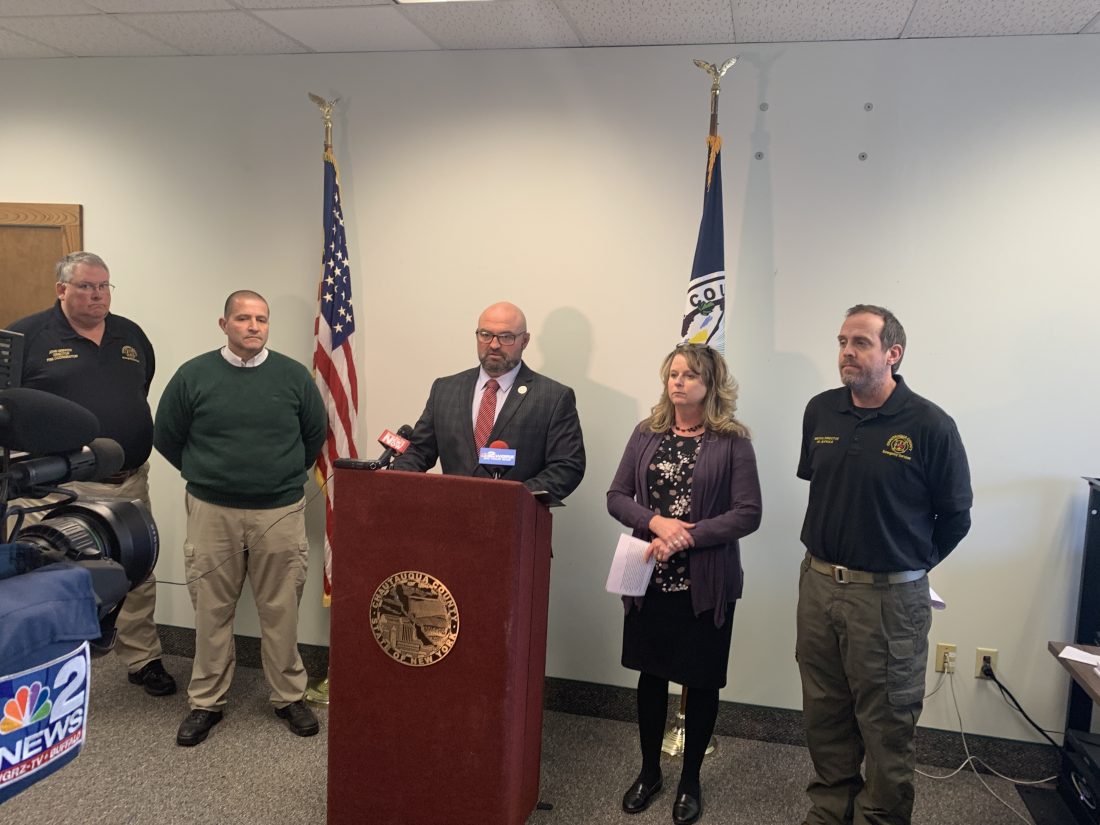With focus on vaccine, a look back at how the pandemic affected us
COVID’s long winter

OBSERVER File Photo Chautauqua County Executive PJ Wendel is pictured in March declaring a state of emergency with other county officials in Mayville. Several schools decided to go to a remote learning model shortly after.
From March to now, everywhere we went in 2020, COVID-19 was there.
Just last week, news has come that the first doses of the COVID-19 vaccine are set to be administered to residents at Heritage Ministries’ skilled nursing facilities in Chautauqua County as the county has begun receiving doses of the Pfizer and Moderna vaccines.
Lisa Haglund, Heritage president and CEO, said the organization will receive the vaccines as part of the federal government’s partnership with CVS and Walgreens. Pharmacists from the two national chains are scheduled to go into long-term care facilities to administer the doses to residents and staff.
Locally, Haglund estimates it will take about 30 to 60 days to complete the vaccination process in the facilities that include residents and staff. In the county, Heritage has about 800 residents and between 800 and 1,000 total employees.
“We are reaching out to every family to gain permission to roll this out at our skilled nursing facilities,” Haglund said. “They are the most vulnerable, and a good percentage of them are signing up to keep their loved ones safe.”
Vaccinations, the spread of the virus among those who haven’t been able to get vaccinations yet and the possibility of parts of Chautauqua County being in Cuomo’s microcluster designations will be the COVID-19 story for the first few months of the year.
“We are looking at spring before the general population will probably receive any vaccine. In the meantime, especially through these winter months … we really have to take care of ourselves and those that are close to us. Wear a mask, continue to wash hands, social distance and avoid large gatherings,” said Christine Schuyler, Chautauqua County public health director and commissioner of Social Services, last week.
As we begin our 20 for 2020 series, here is a look back at five COVID-19 stories that resonated with readers over the past year.
OUTBREAK IN THE COUNTY JAIL
December brought the news from Sheriff James Quattrone that there had been a COVID-19 outbreak in the Chautauqua County Jail.
Since the first case of COVID-19 was detected, roughly 90 inmates and 15 staff members have tested positive for the virus.
Quattrone said it’s unlikely a new inmate brought the virus into the facility because all new inmates are put into quarantine for 14 days before they are put into general population.
“It’s likely this was transmitted through staff or providers like mental health,” Quattrone said.
Employees are screened each shift before entering the jail at one point of entry to ensure no one is showing any signs of the virus. The staff is also expected to self-report symptoms and stay home if they feel ill.
“We have a great team of doctors and county public health officials giving us guidance on the right procedures to implement,” Quattrone said, noting that staff have been “extremely diligent” in cleaning procedures as well as encouraging those feeling sick to avoid coming into work. “Overall, I think it’s helped keep COVID out and other illnesses out (of the jail).”
A HARROWING EXPERIENCE
One of the first to test positive for COVID-19 shared her experience.
Ronni Thompson first noticed something was amiss in early March when she couldn’t clear her throat. She was painting her living room inside her Dunkirk home, so she figured the dust was causing some irritation.
Three days later, her world went hazy.
“I was just withering in pain,” said the 33-year-old Thompson, who became the first Chautauqua County resident confirmed to have the coronavirus
“I had body aches and I couldn’t sit up,” she said of the worst pain she’s ever experienced in her life. “I had this awful cough. It just feels like someone punched you in the diaphragm, it was super, super painful.”
Asked of words of advice for those out there concerned or have questions regarding the virus, Thompson said to listen to the health care professionals and heed advice of staying home to limit the spread. She said those worried they may have the virus should contact their doctors as she did, and of course to wash their hands regularly.
“One hundred percent I am going to be changed for life,” Thompson said. “I’m going to think about my kids when we’re at the store and I’m going to have to think ahead from now on.”
AN EARLY WARNING FROM SUNY FREDONIA PROFESSOR
Ted Lee, in a statement to the OBSERVER in mid-March, said residents needed to focus on what could happen and how best to prepare even though there were no confirmed cases in Chautauqua County. Lee’s statement came after three Erie County residents had been diagnosed with the virus.
Lee was involved in some of the preparations that took place at the State University of New York at Fredonia. When Gov. Andrew Cuomo announced a shift to distance learning, the university was forced to come up with a plan on how to proceed in short notice.
“I don’t want people to panic, rather it is important that people are aware of the significance of the public health threat caused by this virus and the need to address the threat effectively,” Lee said in his statement. “Rather than buying as much toilet paper, hand sanitizer and bottled water as we can, let’s us think about what we can best to prepare with and for our families, our neighbors, and community. This may very well be a major stress test for ourselves and our community. Let us work to show what we are capable of doing. The cancellation of school events and trips would be prudent at this time.”
Lee also gave county residents a first glance at a name that would become well known as the COVID-19 pandemic spread throughout the nation — Dr. Anthony Fauci.
Lee concluded: “An excellent starting point for getting honest, insightful, and informed information is from Dr. Anthony Fauci, the Director of the National Institute of Allergy and Infectious Diseases. He has advised 6 presidents and has testified before Congress and given many interviews on this virus. He testified before Congress on March 11 and said ‘that this is a really serious problem that we have to take seriously.”
A MAJOR OUTBREAK
A COVID-19 outbreak at a then-unnamed business in late August was cause for concern for OBSERVER readers.
The OBSERVER was the first news outlet in the region to report on the outbreak after employees and members of their families learned of the problem and told the newspaper about their concerns. It wasn’t until Cuomo made the decision to name the business in a news conference that it was learned the outbreak was from Fieldbrook Foods.
Christine Schuyler, county public health director, said the first positive COVID-19 case related to Fieldbrook was confirmed Aug. 16.
“The initial case investigations found several confirmed cases associated with this employer, indicating the potential for a larger outbreak to occur,” Schuyler said. “As such, we have been proactively working with New York State Department of Health and administration of Fieldbrook Foods to manage and control the spread of disease. The increased number of positive tests reported this weekend substantiated our concern about a potentially larger outbreak.”
The outbreak prompted Cuomo to send a “testing SWAT team” to Dunkirk.
PANIC BUYING
For all the requests for calm back in March, people didn’t shop with a sense of calm.
For the first time in years, Walmarts across the nation announced they would close through the night. Their new hours, differing greatly from their 24-hour schedule, were limited to opening at 7 a.m. and closing at 8:30 p.m. Tops also changed its hours.
During a walk through Walmart, there was no toilet paper, orange juice or soup in sight. Along with bleach and other cleaners being totally wiped out, there was no laundry detergent and batteries were nowhere to be found.
A lot of these customers had gloves and masks on, protecting themself from the possible exposure to the novel coronavirus. Some were even running through the store, only pausing to chuck various items into their cart.
Traveling down the medication aisle was a whole different ballgame — only various arbitrary medicines left, such as ZzzQuil, allergy medication and nasal sprays. All of the cold and flu pills and liquids were sold out. In this same area, flushable wipes, Q-Tips, masks, gloves and even tubes of toothpaste were all gone.
Tops was just as barren in some aspects, with the toilet paper aisle completely picked clean of more than just toilet paper. Paper towels, baby wipes, napkins, and really any cleaning supplies were entirely out of stock.
Further walking through the Tops aisles, the hopes of making any kind of rice dish for dinner were all but squashed, as only a few bags remained; the soup and pasta aisles were also picked clean, with only select boxes of fettucine and cans of spicy chicken noodles left.
Sandwiches were also almost out of the question for a meal option, as a majority of the bread was also vacated from the shelves. Meats and vegetables were starting to build up once more, but slowly.





